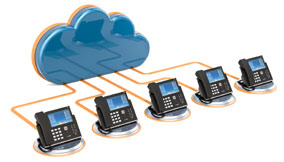On-premise PBX versus a Cloud based PBX Explained
 An
on-premise PBX is a PBX system that resides inside the business facilities. On-premise
phone systems offer unique benefits for businesses, like more control,
total ownership and instantaneous signaling inside the premise, rather than over
the Internet. They also furnish several ways to connect to the
PSTN (Public Switched Telephone Network). They can connect using traditional
CO business phone lines, a PRI/T1 circuit and/or VoIP using SIP trunks.
On-premise PBXs represent a leading choice for retail,
industrial/warehouses and establishments that employ a receptionist inside the
office.
An
on-premise PBX is a PBX system that resides inside the business facilities. On-premise
phone systems offer unique benefits for businesses, like more control,
total ownership and instantaneous signaling inside the premise, rather than over
the Internet. They also furnish several ways to connect to the
PSTN (Public Switched Telephone Network). They can connect using traditional
CO business phone lines, a PRI/T1 circuit and/or VoIP using SIP trunks.
On-premise PBXs represent a leading choice for retail,
industrial/warehouses and establishments that employ a receptionist inside the
office.
A cloud
based VoIP PBX comprises a phone system where the PBX server resides at the provider's premise,
often hundreds, or even thousands of miles away. Users connect over the
cloud using VoIP. Hosted PBX systems
provide benefits ranging from low initial costs with easy, quick setup to
sophisticated call solutions employing integrated Omni-channel communications. Hosted solutions
provide apps, like chat, video and voice, that allow teams multiple ways to
communicate. Additionally, companies benefit from the ability to immediately
add more phone numbers and scale instantly. Cloud-based providers
maintain the server's hardware and software, as well as providing customer support as part of the service. Cloud-based solutions routinely
provide an outstanding value for businesses with distributed remote workers,
multiple location organizations and new companies, to name just a few.
Cloud based Business Phone System vs. an On-premise IP-PBX. Which is better?
Contact centers maintain completely unique requirements from a brick and mortar parts store. When considering the best phone system, let a professional evaluate your specific business needs and budget.
When considering the pros and cons of any phone system, whether
on-premise or cloud-based, there are distinct advantages with one over the
other. Depending on your business needs, situation and resources,
one system will be the better choice over the other. Hosted PBX
solutions frequently do not represent the leading choice for some types of businesses.
Factors
that guide the decision-making process include PBX features, cost and installation requirements,
including integration with apps and existing hardware, like paging and
facility access. The user's
infrastructure and the number of telephones required add into the equation.
Companies with 40 to 100 phones that connect with a PRI and facilities that retain a mixture of cabling (phone and
Ethernet)
often find the preferred choice to be an on-premise PBX as the most cost-effective
efficient solution.
 For
companies with multiple locations that communicate directly with
each other
or businesses that support remote workers, a
hosted PBX solution repeatedly remains the preferable choice. Likewise, for a new sales office needing to be up
and running quickly, hosted VoIP represents the most suitable solution.
Industry statistics this past year expected very small businesses that use
VoIP to experience a 90% reduction in start-up costs2. And micro-companies along
with
solo entrepreneurs routinely
gain a big
company presence at an exceedingly modest expense employing a cloud based
or virtual phone solution.
It has been noted that Unified Communications systems deliver the greatest
benefit for solo workers.3
For
companies with multiple locations that communicate directly with
each other
or businesses that support remote workers, a
hosted PBX solution repeatedly remains the preferable choice. Likewise, for a new sales office needing to be up
and running quickly, hosted VoIP represents the most suitable solution.
Industry statistics this past year expected very small businesses that use
VoIP to experience a 90% reduction in start-up costs2. And micro-companies along
with
solo entrepreneurs routinely
gain a big
company presence at an exceedingly modest expense employing a cloud based
or virtual phone solution.
It has been noted that Unified Communications systems deliver the greatest
benefit for solo workers.3
Control
For companies that want absolute control over their phone system and how it integrates with specialized apps and peripheral equipment, the right on-premise IP-PBX remains the preferable choice. For businesses that may require some control at the management level and granular control for employees, a hosted solution represents the leading choice. Hosted PBX providers offer well-designed user-friendly controls that are intended for the casual user.
- ADVANTAGE - An on-premise PBX for companies with capable, trained administration staff.
- ADVANTAGE - A cloud-based PBX for user control.
At-home workers
The significant rise in remote at home employees has altered how
business owners presently perceive their communication systems. At home
work remains a priority for many workers. A recent Gallup poll showed 45% of full-time employees, and 67% of white-collar employees are still working from
home to some degree. And many managers foresee making partial
remote work a permanent offering for employees who do not want to return
to the office.
Businesses that must consist of on-site employees do not
regard their phone system in similar ways. Jobs that demand a presence at the
establishment like, brick-and-mortar retail, dental offices and
restaurants, as examples, regularly look at a more traditional on-premise phone
system.
- ADVANTAGE - A cloud-based PBX for that use remote and on the road employees.
Security
94% of businesses reported an improvement in security after switching to the cloud. 91% said the cloud made it easier to meet government compliance requirements.
Whether you get a cloud-based hosted phone system or an on-premise IP-PBX solution, both should be secure by employing proper administration and good system management. The caveat would use at-home and remote workers, where a hosted VoIP PBX possesses an advantage with systems designed to allow users to connect easily from anywhere. Small companies rarely have trained network security staff employed and must depend on outside personnel, which comes at a cost. Attention to security is compulsory for companies that require the most recent technology. However, many very small companies that possess a professionally installed on-premise PBX find they can remain secure without the need for constant scrutiny.
- ADVANTAGE - A cloud-based PBX provider retains experts in security that manage their network.
Artificial Intelligence- AI
Undeniably, communication is moving to Artificial Intelligence with substantial progress having occurred over the last two years. These advanced AI systems improving customer relationships in ways that benefit both customers and businesses. Many businesses are failing to prepare for the future, which will be led by Artificial Intelligence (AI). Leading hosted VoIP companies and several large PBX manufacturers are designing and implementing automation in communication and customer relationship services. Everyone recognizes the need to not only stay current, but advance their platforms to exceed their competition. Predictions have suggested that by 2025, AI will power 95% of all customer interactions, including live telephone and online conversations. Employing a UCaaS solution will help future proof your business in ever-changing communication.
- ADVANTAGE - A cloud-based PBX or UCaaS provider.
Costs of an on-premise IP PBX compared to a hosted VoIP Cloud Solution
The average cost of an IP PBX system for a business with 1-20 employees is $16,867. This cost rises to over $1 million for businesses with more than 2,500 employees.3
Purchasing an on-premise PBX requires the IP-PBX server configured with the correct Interface cards, telephones, gateway devices
and other peripheral hardware, plus professional on-site installation.
Cloud-based PBXs sole hardware are typically phones
and setup is relatively easy with no cost. The result is that the initial
outlay for an on-premise PBX is substantially greater than for a cloud
PBX system. Over time costs do narrow and can often be less for an
on-premise solution for many businesses. Furthermore, different on-premise
phone systems vary significantly in price, allowing business owners the
feasibility of achieving a solution in nearly any price range. Excellent new and
refurbished systems exist, adding to the wide variation in prices.
Some large organizations regularly
discover they can recoup their initial outlay of expenses when
purchasing an on-premise PBX through the use of on-site administration. By using trained in-house support
personnel, large companies find it’s easy to add and remove users at no
additional cost.
Hotels and hospitality routinely favor an on-premise IP-PBX, as monthly expenses for a
hosted solution remain excessive for the large number of phones required.
Many of which aren't used a great deal.
Maintenance costs
remain greater with an on-premise PBX, however, some systems can be installed and left alone for
numerous years. In these cases, an on-premise phone system will assuredly be considerably lower in cost over time.
- ADVANTAGE - A Cloud-based Business PBX for Small Companies that require Omni-channel leading technology. As reliance on video has increased over the last year, businesses that utilize providers offering integrated voice and web conferencing frequently experience a 30 percent reduction in conferencing expenses1.
- ADVANTAGE - An On-premise PBX for Small Companies that maintain traditional phone system requirements and do not require the latest, most recent advanced technology.
- IMPORTANT CONSIDERATION - Having on site IT personnel capable of maintaining and upgrading the phone system is critical for very large on-premise IP-PBXs. Paying for outside vendors to make adds, moves and changes can be costly. Hosted PBX providers include support as part of their monthly fees and offer platforms that are both user friendly and much easier to configure.
Most businesses maintain a unique set of requirements. Some want affordability, reliability and ease of use. Others require multiple attendants, queues and call recording. A business phone system becomes a communication solution when it offers the right features at a price within your budget.
 As
a business owner looking for an on-premise phone system, the amount of
obtainable
information can be overwhelming. Repeatedly, the most efficient solution is to get a
few quotes based on your particular requirements and price range. Then allow a
professional to explain advantages of an appropriate system and how it will
benefit your business. Telecom professionals are experienced in
which phone systems offer the most useful
solution.
As
a business owner looking for an on-premise phone system, the amount of
obtainable
information can be overwhelming. Repeatedly, the most efficient solution is to get a
few quotes based on your particular requirements and price range. Then allow a
professional to explain advantages of an appropriate system and how it will
benefit your business. Telecom professionals are experienced in
which phone systems offer the most useful
solution.
Take a minute and respond to a few straightforward questions.
Find the right telephone system for your
business. (No cost and no obligation.)
Call Quality of an on-premise PBX compared to a hosted VoIP Cloud Solution
Internet service (WAN) has become remarkably stable over the last few years,
reducing the once cautionary tales of dropped calls and broken voice that
resulted with a cloud based PBX. However, maintaining an efficient network inside your Local Area Network (LAN) is essential. Streaming and
other intensive apps often need to be managed to prevent jitter on the
network, which can cause broken voice. This requires a capable router and someone who can configure it
and administer the network.
Small on-premise PBX systems
rarely require any attention to the network,
simplicity for those that want simplicity.
- ADVANTAGE - An on-premise PBX.
Businesses that do Best With an on-site PBX and Businesses that do Best With a Cloud PBX
Best for On-Site PBX
- Medium-sized to very large companies that have the technical resources capable of managing and maintaining the system, features and integrations.
- Mid-sized companies that have a PRI/T1 and want to maintain that service.
- Integrated UC deployments that include systems like hotel management, unique CRM packages and particular types of contact centers.
- Mixed use facilities, like an office/warehouse that include phones located around the warehouse.
- A single office with no need for doing business outside of normal office hours and has a receptionist answer the phone.
- Automotive repair centers, part stores, collision shops, restaurants, retail, etc.
- Businesses that need their phone system to integrate with various analog devices (paging, facility access controls, etc.).
Best for Hosted Cloud-Based PBX
- Small offices, especially new companies where saving costs represents a significant advantage.
- Small professional offices that can benefit from the latest UC features, but don't retain an IT staff.
- Entrepreneurs, micro businesses and mobile operations.
- Loan companies and other types of financial businesses that need to record their calls.
- Companies that implement CRM packages, like Salesforce and other well-known apps, as most hosted VoIP providers implement integration.
- Businesses that know they will move locations in the near future.
- Start-ups that might use contract employees located globally. Small software developers and companies that employ remote teams.
- Temporary facilities, like yearly tax filing offices and political campaigning headquarters.

Points to Consider that remain Important
- New Communication Apps - About ten years ago, a must-have requirement for a new PBX for some was an automated call-back feature. Callers would maintain their position in the queue and receive an automated call back when their time came. Presently AI (Artificial Intelligence) suggested message responses that automate note-taking and generate call summaries are popular. With that in mind, which next feature will be critical? Hosted PBX solutions and some telecom companies (i.e. Mitel, Avaya, etc.) are constantly developing new features they will eventually roll out. As a consequence, price increases become the norm. The case with on-premise IP-PBX systems remain more cumbersome, as either upgraded versions of software or a new IP-PBX server become necessary. Upgrading adds expense.
- ADVANTAGE - For some very small companies, a cloud-based business PBX. For very large companies an on-premises PBX.
- Lower prices of business phone lines - Traditional phone lines once only came from the phone provider in the area and prices reflected that. Now cable companies provide both Internet and phone service to local small businesses. These discounted business phone lines connect like traditional business CO lines to the PBX and have resulted in lower PSTN phone costs across-the-board. Installing SIP trunks (lines) using VoIP can significantly reduce costs for most on-premises PBXs.
- ADVANTAGE - An on-premise PBX, along with lower costs.
Points to Consider that were once Significant, but are less So now
- Stable, Affordable, Robust Internet - A good Internet pipe is critical for a cloud based phone solution. Most places in the USA now have good low cost Internet (WAN) with more than enough bandwidth. However, if your service is sketchy in your location, then an on-premise PBX connected through traditional phone lines is the better choice.
- Redundancy and Failover - Once a hosted solution retained an advantage, but now most on-premise systems can be configured for failover in case of an outage. This includes setting up alternative routing with the local carrier in the event of loss of contact with the on-premise PBX.
See which VoIP companies we recommend: Best Cloud Phone Systems These are the top on-premise PBX solutions: Top Rated on-premise PBXs
Reference and Sources
1VoIP- Cold, Hard VoIP Facts -
Multicom
2
VoIP Industry Statistics
Startupanz
3Business VoIP Statistics
SpectrumVoIP
Remote Work Persisting and Trending Permanent
Gallup
Benefits of Cloud Computing
Salesforce